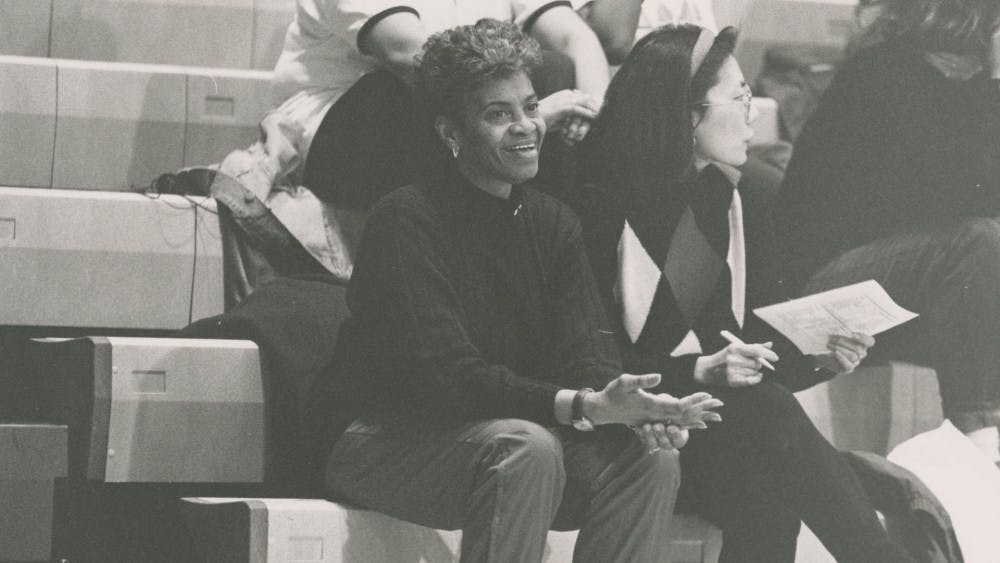Former gymnastics coach Jackie Court, the first woman of color to coach at Brown, passed away April 12 at the age of 81. Court led the Bears for over 30 years and was accomplished both in her coaching and her fight for women’s equality in sports.
Court arrived at Brown in 1969 and continued to improve the gymnastics program throughout her career. She was described by her former players as a tireless advocate for women’s rights in every facet of life, and empowered her athletes to strive for personal success while exuding modesty. “She never boasted about anything, she simply did what needed to be done with grace and serenity — much like the ocean, quiet yet powerful,” Brown Athletic Hall of Fame Inductee and NCAA National Qualifier Debbi Fuhrman ’84 wrote in an email to The Herald.
In April 1992, Coach Court stood behind her team as co-captain Amy Cohen ’92 led a Title IX lawsuit against the University for gender-based discrimination after the 1991 announcement that four varsity sports, including gymnastics, would have their funding cut.
But the gymnasts soon found out that they were not the only women fighting for equal opportunity in sport — Coach Court was not receiving equal pay.
“It wasn’t until Brown tried to eliminate our team in 1991 that I learned Coach Court was only paid as a part-time coach even though she had the same responsibilities of recruiting and coaching as all the full-time coaches,” Cohen wrote.
According to Brown Athletics, Court earned Eastern College Athletic Conference Coach of the Year honors in 1997 and 1999 and was recognized as NCAA Northeast Region Coach of the Year in 1999. She earned a Special Service Award from the National Association of Collegiate Gymnastics Coaches in 1994 and two years later, she was inducted into the Northeast Women’s Hall of Fame. During her coaching career, Court was the Rhode Island State Chairperson of USA Gymnastics, the District Chairperson for the National High School Federation and an advisory board member for the Women’s Sports Foundation and New England Women’s Fund.
Enthusiastic tributes from her family and former team members revealed Court’s impact on the Bears. Coach Court was “not only a coach but a friend,” Fuhrman wrote. Fuhrman embarked on an arduous training regimen for the 1980 Olympic Games in Moscow, only for the United States to boycott the event. She struggled to imagine a future in college gymnastics, but upon her arrival at Brown, Coach Court welcomed Fuhrman and provided a fulfilling experience as a student-athlete.
“We were students, studying the gamut of the curriculum, and we were gymnasts, finding an outlet to express ourselves and focus our excess energies through movement and feats of skill. There was no expectation set on us other than to do our best,” Fuhrman wrote. Under the tutelage of Coach Court, Fuhrman became the first Brown gymnast to win an event at the Ivy League Championships, capturing the vault title.
Tracy Vietze ’84 echoed these sentiments based on her 15-year competitive gymnastics career, which was heavily influenced by the presence of Coach Court.
“Given her leadership, her exceptional standing and many contributions to the gymnastics community as an official, coach, organizer and expert, I had the privilege of learning from her for decades,” Vietze wrote in an email to The Herald. Under Coach Court, Vietze was named an NCAA Regional Qualifier in the All-Around. “There was great love and admiration for Coach Court. Brown student athletes came into her orbit via the gymnastics team but left surrounded by the foundation she provided for life,” Vietze added.
John Court, son of Coach Court and Head Coach of gymnastics at the University of Arizona, described his mother as a selfless leader who sided with her athletes as they fought for the right to compete in the sport that they loved.
“For all she did, she never expected attention for it. She used her time to benefit others and make a difference,” he wrote in an email to The Herald.
In 1997, Brown restored funding to women’s gymnastics and elevated three other women’s teams to varsity status. From 1969 until her retirement in 2001, Court inspired her athletes and served as a beacon of positivity for all who knew her. Fuhrman represented the voice of many Brown athletes when she reflected on her time with Coach Court.
“She was an exceptional woman and I am honored to have crossed paths with her in this lifetime,” Fuhrman wrote.

ADVERTISEMENT




